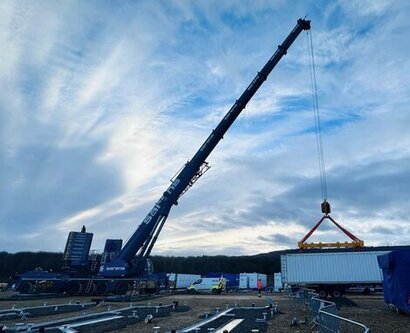
The works to build a 300-megawatt (MW) battery energy storage project (BESS) in the UK has begun. Sarens has been enlisted to lift and install 54 sets of battery storage systems in a project that lasted 38 days in total. The Cellarhead BESS project will be connected to National Grid’s Cellarhead sub-station and will provide the country with additional energy security and reliability. This new project is a significant battery energy storage system (BESS) located in the West Midlands and it’s anticipated to connect to the electricity grid at the end of 2026.
Sarens, global leader and reference in crane rental services, heavy lifting and engineered transport, has been appointed for a contract lifting with its 450T mobile crane to install the 54 sets of battery storage systems. The heavy lift mobile crane, the LTM1450, completed the battery installations between 6 locations, being the further reach 40.5 meters.
Crane operators, engineers, lift supervisor and rigger helped to reduce costs in the project due to the installation of the sets in a reduced time. The project was planned to last 54 days, but the team completed the job in 38 days in total.
The BESS project will assist the UKs ambition to achieve net zero, supporting the increased penetration of clean energy generation, decreasing reliance on fossil fueled generation, and ultimately mitigating greenhouse gas (GHG) emissions.
Energy storage is one of the key technologies required to achieve the UK’s net zero targets. Deploying long-duration energy storage technologies at scale is critical to ensure the UK can maintain energy security and reach Net Zero. The UK government has enshrined in law a commitment to achieve net zero carbon emissions by 2050.
The UK has been devoting significant attention to BESS implementation in recent years. The National Grid has been working to increase the speed at which BESS projects are connected to the grid and announced in November 2023 that it would accelerate the connection dates for 19 battery energy storage projects with a cumulative capacity of around 10 GW.
For additional information:

